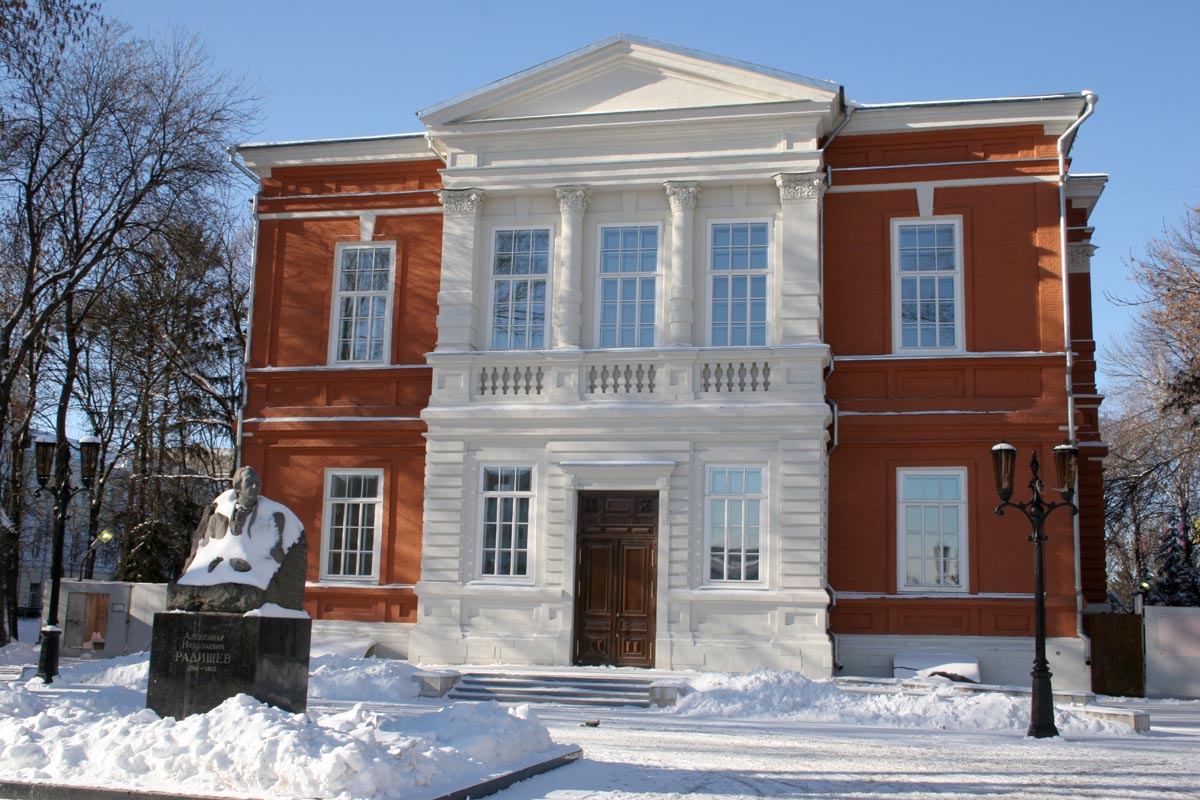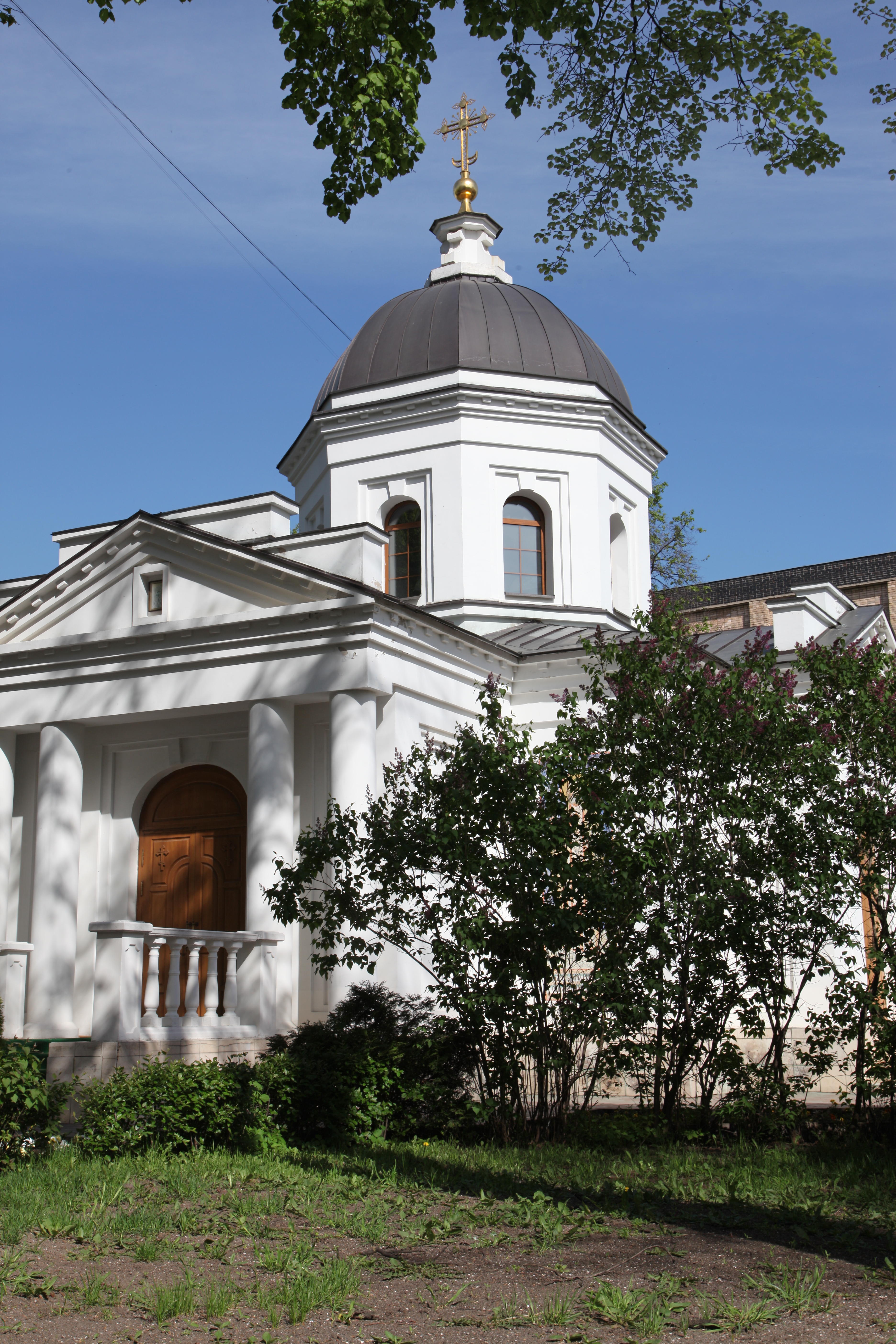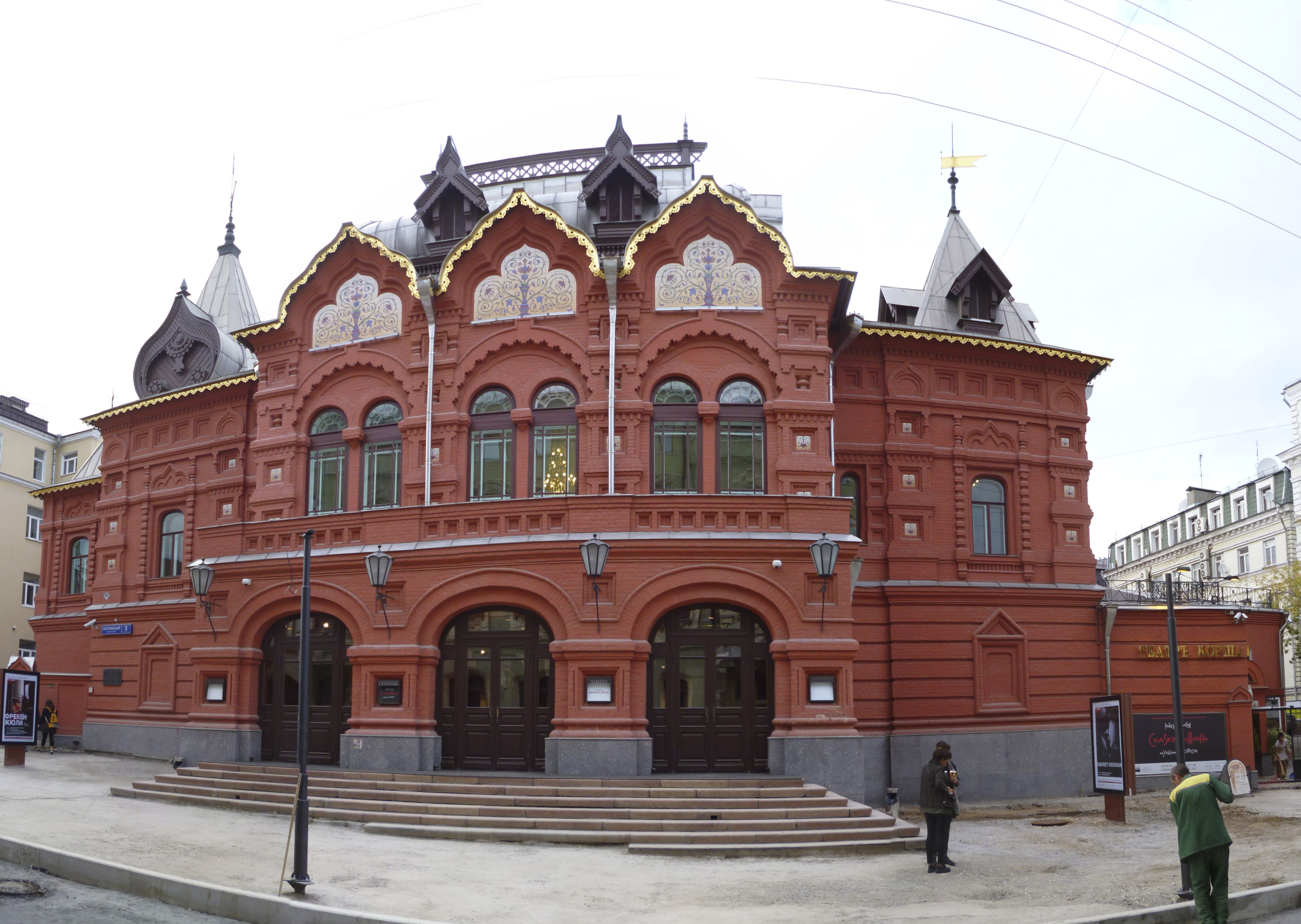|
Yevgeny Mironov (actor)
Yevgeny Vitalyevich Mironov (Russian: Евгений Витальевич Миронов; born 29 November 1966) is a Soviet and Russian film and stage actor. Merited Artist of the Russian Federation (1996), People's Artist of Russia (2004), State Prize of the Russian Federation laureate – 1995, 2010. Yevgeny Mironov lives and works in Moscow, Russia. Mironov is artistic director of the Theatre of Nations. Early life Yevgeny Mironov was born in Saratov, Russian SFSR, Soviet Union (now Russia). The family lived in a small military town then called Tatis. Yevgeny's father was a professional chauffeur, his mother changed jobs – from saleswoman to a Christmas ornaments manufacturer. The Mironovs, avid amateur performers, were artistic and creative people in their everyday life. Mironov as a child took acting classes, joined an amateur dance group and graduated from music school as an accordion player. He and his younger sister Oksana put on puppet shows for which they made ... [...More Info...] [...Related Items...] OR: [Wikipedia] [Google] [Baidu] |
Saratov
Saratov (, ; rus, Сара́тов, a=Ru-Saratov.ogg, p=sɐˈratəf) is the largest city and administrative center of Saratov Oblast, Russia, and a major port on the Volga River upstream (north) of Volgograd. Saratov had a population of 901,361, making it the 17th-largest city in Russia by population. Saratov is from Volgograd, from Samara, and southeast of Moscow. The city stands near the site of Uvek, a city of the Golden Horde. Tsar Feodor I of Russia likely developed Saratov as a fortress to secure Russia's southeastern border. Saratov developed as a shipping port along the Volga and was historically important to the Volga Germans, who settled in large numbers in the city before they were expelled after World War II. Saratov is home to a number of cultural and educational institutions, including the Saratov Drama Theater, Saratov Conservatory, Radishchev Art Museum, Saratov State Technical University, and Saratov State University. Etymology The name Sarat ... [...More Info...] [...Related Items...] OR: [Wikipedia] [Google] [Baidu] |
State Prize Of The Russian Federation
The State Prize of the Russian Federation, officially translated in Russia as Russian Federation National Award, is a state honorary prize established in 1992 following the breakup of the Soviet Union. In 2004 the rules for selection of laureates and the status of the award were significantly changed, making them closer to such awards as the Nobel Prize or the Soviet Lenin Prize.Order of President of Russian Federation N785 on reform of state awards 21 June 2004 Every year seven prizes are awarded: * Three prizes in science and technology (according to newspaper there was a fourth 2008 State Prize for Science and Technology awarded by a sp ... [...More Info...] [...Related Items...] OR: [Wikipedia] [Google] [Baidu] |
Pyotr Todorovsky
Pyotr Yefimovich Todorovsky (russian: Пётр Ефи́мович Тодоро́вский, uk, Петро Юхимович Тодоровський, 26 August 1925 – 24 May 2013) was a Russian film director, screenwriter and cinematographer of Jewish origin. His son Valery Todorovsky is also a film director. Career Todorovsky joined the Red Army during World War II and drew on his war experiences for a number of films, including ''Rio-Rita'' (2008). In the 1950s, he worked as a cinematographer for Marlen Khutsiev. He liked to play guitar and composed songs for some of his films. Todorovsky's early 1980s melodramas gained him wide popularity in the Soviet Union. They have been described as "delightfully unpretentious comedies, homourous and touching at the same time". Todorovsky's ''Intergirl'' (1989) was the first Soviet film about prostitution and caused quite a stir. His next film ''Encore, Once More Encore!'' (1992) presents a grim picture of moral prostitution in a ... [...More Info...] [...Related Items...] OR: [Wikipedia] [Google] [Baidu] |
Valery Todorovsky
Valery Petrovich Todorovsky (russian: Вале́рий Петро́вич Тодоро́вский; born 9 May 1962, in Odessa) is a Russian film director, screenwriter, TV producer whose best known film is '' Hipsters'' (2008). He is the son of Pyotr Todorovsky. Cinema Of his earlier films, ''The Hearse (Katafalk)'' won the Grand Prix at Mannheim (1990) and ''Love (Lyubov)'' received Ecumenical Prize at Cannes (1992), and won awards at Sozvezdie, Chicago, Geneva and Montpellier Film Festivals. Todorovsky made a name for himself with the crime melodrama set in Moscow, '' The Country of Deaf (Strana Glukhikh)'', scripted by actress-director-scriptwriter Renata Litvinova based on her own novella ''To Have and to Belong''. The film was entered into the 48th Berlin International Film Festival in 1998. In 1999 he was a member of the jury at the 21st Moscow International Film Festival. His 2008 musical film '' Hipsters'' won the Golden Eagle Award and Nika Award for Be ... [...More Info...] [...Related Items...] OR: [Wikipedia] [Google] [Baidu] |
Alexander Kaidanovsky
Alexander Leonidovich Kaidanovsky (russian: Алекса́ндр Леони́дович Кайдано́вский; 23 July 1946 — 3 December 1995) was a Soviet and Russian actor and film director. His best known roles are in films such as ''At Home Among Strangers'' (1974), '' The Bodyguard'' (1979) and '' Stalker'' (1979). Prior to pursuing an acting career, Kaidanovsky attended technical college where he was training to become a welder. In 1965 he started studying acting at The Rostov Theatre School and the Schukin Institute in Moscow. Before completing the course he took his first part in the film ''The Mysterious Wall'' (1967) and upon graduation in 1969, he worked as stage actor. In 1985 he directed ''A Simple Death'', which was screened in the Un Certain Regard section at the 1987 Cannes Film Festival. Kaidanovsky made his theatre debut at the Vakhtangov Theatre in 1969. In 1971 he was invited to join the Moscow Arts Theatre, the best classical theatre in Russia, a ra ... [...More Info...] [...Related Items...] OR: [Wikipedia] [Google] [Baidu] |
Vladimir Mashkov
Vladimir Lvovich Mashkov ( Russian: Владимир Львович Машков; born 27 November 1963) is a Soviet and Russian actor and director of cinema, known to Western audiences for his work in the 2001 film '' Behind Enemy Lines'' and 2011 film '' Mission: Impossible – Ghost Protocol''. Mashkov has also worked as a film director, producer and writer for the 2004 Russian film '' Papa''. Politically, Mashkov is noted for his public support for Vladimir Putin and Russia's invasion of Ukraine. Biography Early life and education Mashkov was born on 27 November 1963, in Tula, Russian SFSR, Soviet Union (now Russia). His mother, Natalia (1927–1986), was a puppet theatre director, and his father, Lev Mashkov (1925–1987), was an actor. He made his debut on stage as a child, took part in the productions of a school theater group, performed with his parents in the Novokuznetsk Puppet Theater. In the late 1970s, Mashkov entered the biological faculty of Novosibirsk Stat ... [...More Info...] [...Related Items...] OR: [Wikipedia] [Google] [Baidu] |
Oleg Tabakov
Oleg Pavlovich Tabakov (russian: Олег Павлович Табаков; 17 August 1935 – 12 March 2018) was a Soviet and Russian actor and the Artistic Director of the Moscow Art Theatre. People's Artist of the USSR (1988). Biography Tabakov was born in Saratov into a family of doctors. His paternal great-grandfather, Ivan Ivanovich Utin, came from serfs and was raised in a wealthy peasant family under the Tabakov surname. His grandfather, Kondratiy Tabakov, worked as a locksmith in Saratov where he built himself a house and married a local commoner Anna Konstantinovna Matveeva. Oleg's father, Pavel Kondratievich Tabakov, worked at the State Regional Research Institute of Epidemiology and Microbiology "Microbe" in Saratov.''Oleg Tabakov, Anatoly Smelyanskiy (2000)''. My Real Life. — Moscow: Eksmo-Press, pp. 22—48 (Autobiography) His maternal grandfather, Andrei Frantzevich Piontkovsky, was a Polish nobleman who owned lands in the Podolia Governorate and married a ... [...More Info...] [...Related Items...] OR: [Wikipedia] [Google] [Baidu] |
Saratov Slonov Theater School
Saratov (, ; rus, Сара́тов, a=Ru-Saratov.ogg, p=sɐˈratəf) is the largest city and administrative center of Saratov Oblast, Russia, and a major port on the Volga River upstream (north) of Volgograd. Saratov had a population of 901,361, making it the 17th-largest city in Russia by population. Saratov is from Volgograd, from Samara, and southeast of Moscow. The city stands near the site of Uvek, a city of the Golden Horde. Tsar Feodor I of Russia likely developed Saratov as a fortress to secure Russia's southeastern border. Saratov developed as a shipping port along the Volga and was historically important to the Volga Germans, who settled in large numbers in the city before they were expelled after World War II. Saratov is home to a number of cultural and educational institutions, including the Saratov Drama Theater, Saratov Conservatory, Radishchev Art Museum, Saratov State Technical University, and Saratov State University. Etymology The name Sarat ... [...More Info...] [...Related Items...] OR: [Wikipedia] [Google] [Baidu] |
Russian State Social University
Russian State Social University (RSSU; russian: link=no, Российский государственный социальный университет, abbreviated as РГСУ) was the first public university in the Russian Federation to offer undergraduate and graduate programmes in the field of social work. It is located in Moscow and has three main historically important campuses. Russian State Social University is recognized as a fully accredited, state-owned, traditional institution. The current rector is Andrey Khazin. History RSSU was founded in 1991 with the mandate to continue the core of the research and teaching activities of the former Higher School of the Communist Party. Initially, research and teaching were focused on the social and political sciences. Gradually, University activities extended into project work on social policy for State Institutions, as well as the education and support of acting administrators. It also became the leading institution for develop ... [...More Info...] [...Related Items...] OR: [Wikipedia] [Google] [Baidu] |
Vaganova Academy Of Russian Ballet
The Vaganova Academy of Russian Ballet is a school of classical ballet in St Petersburg, Russia. Established in 1738 during the reign of Empress Anna, the academy was known as the Imperial Ballet School until the Soviet era, when, after a brief hiatus, the school was re-established as the Leningrad State Choreographic Institute. In 1957, the school was renamed in honor of the pedagogue Agrippina Vaganova, who cultivated the method of classical ballet training that has been taught there since the late 1920s. Many of the world's leading ballet schools have adopted elements of the Vaganova method into their own training. The Vaganova Academy is the associate school of the Mariinsky Ballet, one of the world's leading ballet companies. Students of the school have found employment with ballet and contemporary companies worldwide, such as the Bolshoi Ballet, The Royal Ballet, American Ballet Theatre and the Mikhailovsky Ballet. History The school was established as the Imperial Theatrica ... [...More Info...] [...Related Items...] OR: [Wikipedia] [Google] [Baidu] |
Theatre Of Nations
The Theatre of Nations, also known as the State Theatre of Nations (russian: Госуда́рственный теа́тр на́ций), is a theatre located in the heritage-listed building originally built in 1885 as the Korsh Theatre in central Moscow, Russia. The theatre has no resident acting company. It has a wider scope and versatility than most national theatres, with its remit including conducting national and multinational arts festivals; preserving cultural ties between Russia and the countries of the former Soviet Union; introducing local audiences to notable international arts achievements; and showcasing the experimental work of emerging actors and directors as well as established local and international directors. Several of its shows have toured the world over many years. History Building The theatre building was original built for entrepreneur Fyodor Korsh's theatre, known as the Korsh Theatre, which was one of the first privately-owned Russian theatres, o ... [...More Info...] [...Related Items...] OR: [Wikipedia] [Google] [Baidu] |







